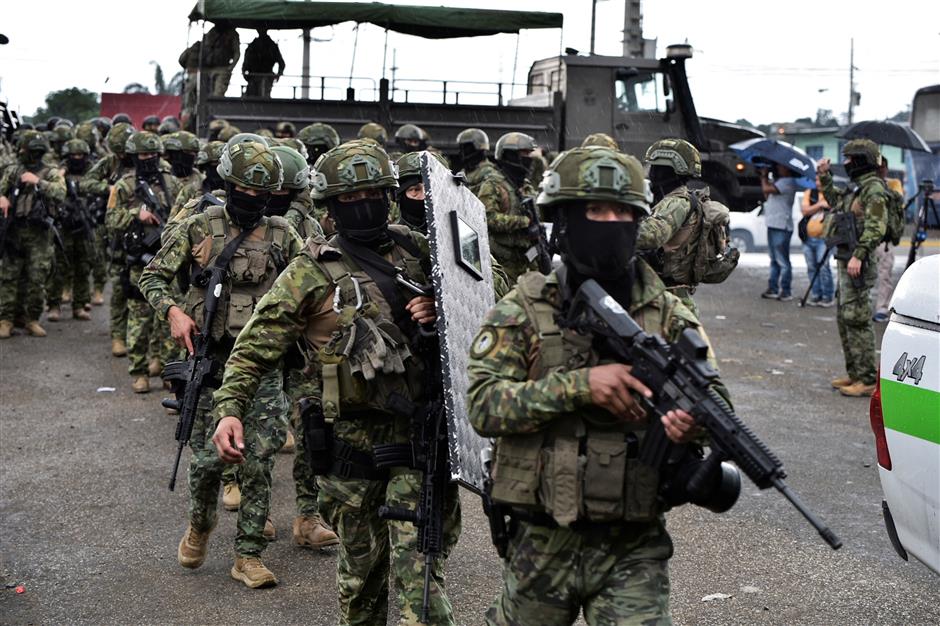
- The repercussions of Ecuador’s crisis extend beyond its borders, affecting neighbouring countries and indirectly influencing the United States.
- South America’s significant role in global affairs, coupled with increased migration flows from the region, amplifies the urgency of addressing the situation.
In a significant development in the new year, Ecuadorian President Daniel Noboa declared an “internal armed conflict” against criminal groups, concurrently imposing a sixty-day state of emergency. This drastic measure comes in response to a series of alarming events, including prison escapes, riots, and targeted attacks on institutions. While the initial steps taken by the Noboa administration are commendable, the gravity of the situation necessitates urgent international support.
The backdrop to this heightened state of affairs can be traced back to December 2023 when Ecuadorian Attorney General Diana Salazar launched the extensive Caso Metástasis investigation. This operation unearthed disturbing connections between criminal groups and various state institutions, leading to numerous arrests across the police, military, judiciary, and other governmental bodies. Despite these efforts, recent events indicate the persistence and deep-seated nature of the issue, with Ecuador now ranking among the most perilous countries globally, boasting a staggering homicide rate of forty per 100,000 inhabitants.
President Noboa’s declaration of “internal armed conflict” unveils the complexity and scale of the problem. The violent incidents that have plagued Ecuador in recent years extend beyond the conventional government-versus-criminal group conflict. Instead, they represent a broader struggle for hostages, territory, and resources among criminal factions, often ensnaring innocent citizens in the crossfire.
The accompanying state of emergency empowers the government to mobilize military forces against twenty-two identified crime groups. While this move underscores the severity of the situation, the sustainability of such an extensive military operation is questionable. The Noboa administration faces financial constraints and a fiscal deficit, posing challenges to maintaining a prolonged and resource-intensive campaign against the lucrative illicit economies managed by criminal organizations.
Prison control emerges as a critical immediate priority. Ineffective prison systems can transform into breeding grounds for criminal activities, complicating efforts to combat organized crime. President Noboa’s proposal to construct new maximum-security prisons is a step in the right direction, albeit one that will require time to materialize. In the interim, prioritizing intelligence sharing and ensuring the armed forces have the necessary equipment is paramount.
Surprisingly, Ecuador’s fragmented National Assembly has displayed unity by offering amnesty to police and military officials involved in the crackdown on organized crime, particularly within correctional facilities. This collective effort indicates a recognition of the urgency and gravity of the crisis at the national level.
However, addressing the root causes of the issue is imperative to prevent a short-term spike in violence. The international community must move beyond rhetoric and offer tangible support, including military equipment, intelligence sharing, capacity building, and enhanced protection for key figures such as Attorney General Diana Salazar and President Noboa.
The repercussions of Ecuador’s crisis extend beyond its borders, affecting neighbouring countries and indirectly influencing the United States. South America’s significant role in global affairs, coupled with increased migration flows from the region, amplifies the urgency of addressing the situation. Criminal organizations exploit these migrations, profiting from human trafficking and exploitation.
When communities are plagued by fear, crime, and a lack of opportunity, individuals may turn to illicit activities for survival. To address this change in perception and morality, the Noboa government, supported by international partners and organizations like the United Nations Office on Drugs and Crime, must adopt a comprehensive approach involving community leaders, civil society organizations, shelters, and schools.
Policymakers must shift their focus from solely addressing the supply side of illicit economies to tackling the demand for such activities. By increasing costs and enhancing law enforcement at various points in the supply chain, international actors can make organized crime riskier and less profitable. Collaborative efforts to prosecute organizations involved in drug, human, and arms smuggling are crucial for long-term success.
The coming weeks will be pivotal in determining Ecuador’s democratic future. Each decision made by the government and its counterparts carries profound implications for citizens grappling with the consequences of organized crime’s pervasive infiltration. A multi-faceted and collaborative approach, both domestically and internationally, is imperative to navigate the complexities of Ecuador’s security crisis and pave the way for a more secure and stable future.
(Aayush is a post-graduate student in International Relations at Kalinga University, Raipur. Views and opinions expressed are the author’s own)
Aayush Pal is a freelance writer on contemporary geopolitical developments. The views expressed in his work are entirely his own.
